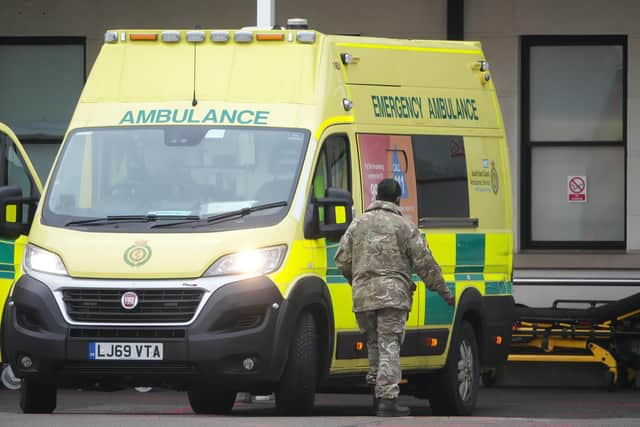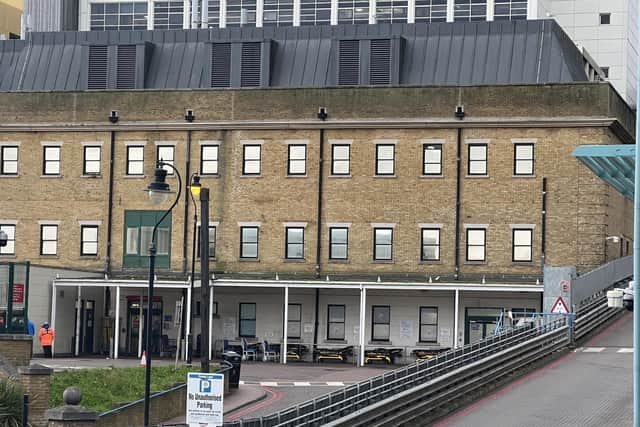Sussex NHS crisis: Everything you need to know about critical incident and second round of strikes involving nurses and ambulance workers
and live on Freeview channel 276
A critical incident was declared by NHS chiefs on December 30 after the service saw very high numbers of people; needing care in A&E departments; calling NHS 111; accessing GP services and calling 999; and also seeing increasing numbers of people being hospitalised with flu and Covid, alongside high levels of staff sickness. The alert remained in place today (Thursday, January 5).
This followed ambulance workers’ industrial action days before Christmas. Photos from the Royal Sussex County Hospital in Brighton showed the military in action, supporting the few ambulance crews – helping to deliver critical patients. There was also a rare sight of A&E ramps devoid of ambulance vehicles.
Advertisement
Hide AdAdvertisement
Hide AdStaff were due to go on strike again on Wednesday, December 28 but this was delayed until January 11.


‘A level of risk that I’ve never seen in my career’
The NHS Sussex Board held a meeting in public on Wednesday (January 4) to provide an update on the current critical incident and second round of strikes next week.
Joe Chadwick-Bell, Chief Executive of the East Sussex Healthcare NHS Trust, said: “There is no doubt we are seeing a level of risk that I’ve never seen in my career before.
“We are absolutely working together well and it’s great to see action across all provides, with a slightly different approach. There's additional support coming in over the next two days.”
Advertisement
Hide AdAdvertisement
Hide Ad

Adam Doyle, Chief Executive Officer for the Sussex Integrated Care Board (NHS Sussex), said the aim is to ‘stand down our critical incident at some point this week’.
“Whilst the new year weekend was a challenge for our system, we do believe the action we’ve taken have put ourselves in a better position this week, coming into the week ahead,” he said.
“We are still seeing high numbers of people with Covid symptoms, high numbers with flu. We are expecting to see a resurgence in RSV (Respiratory Syncytial Virus) pediatric complaints when schools return."
Mr Doyle said the NHS will only stand down from critical incident ‘at the appropriate time’, adding: “We are focusing on keeping our patients are safe and making sure we have the right response going forward.”
Nurses to stage strikes in Sussex this month
Advertisement
Hide AdAdvertisement
Hide AdDr Raju Rajan, a GP from Mid Downs Medical Practice in Lewes said demand has ‘gone through the roof’ and is among the ‘highest I’ve ever seen since I’ve been a GP’.
This could be compounded by the second round of strikes. Last month, only ambulance workers walked-out after The Royal College of Nursing (RCN) confirmed that no trusts in Sussex would be taking part.
It’s a different story this month, though, as the RCN listed four Sussex trusts among those due to join industrial action; East Sussex Healthcare NHS Trust; University Hospitals Sussex NHS Foundation Trust; Sussex Community NHS Foundation Trust; Sussex Partnership NHS Foundation Trust.
Mr Doyle said: “Over the next two weeks, there are further waves of industrial action. One again for the ambulance service and, this time, we can also expect to see our Royal College of Nursing colleagues to also take industrial action because sites across Sussex have also been called out for that.
Advertisement
Hide AdAdvertisement
Hide Ad“It’s a very pressurised time, we are managing it very closely together as a system. We will monitor all the patient safety impact this presents."
The RCN said members will strike over two days. A spokesperson said: “For the first time in history, tens of thousands of our members took part in strikes in December 2022 to demand fair pay and improved patient safety.
"As governments have failed to act, our members will strike again on Wednesday, January 18 and Thursday, January 19.
“This second phase of strike action will only affect members in England. Employers will be affected on both days.”
How are patients being kept safe?
Advertisement
Hide AdAdvertisement
Hide AdDuring the public meeting, Stephen Lightfoot, chairman for NHS Sussex and the Integrated Care Board, asked how patients are being kept safe during the critical incident and strike action.
Allison Cannon, Chief Nursing Officer for NHS Sussex, replied: “Patient experience and safety is our absolute top priority. We recognise the current pressures. People are waiting longer than we would want. Patient experience and safety, at times, is not where we would want it to be for anybody.
"Our staff are working really hard, across all our provider organisations, to look at how we manage safety and risk in a dynamic way.
"We are constantly reviewing all safety and quality metrics, on a daily basis.
Advertisement
Hide AdAdvertisement
Hide Ad“Clinical leadership at any time of crisis, particularly when we are in a critical incident, is really important. We are working really closely with senior clinical leaders across the system.
"We do recognise that for a small number of people, some of their appointments have had to be rescheduled. We do appreciate that will cause some potential upset and anxiety for patients. It’s not a decision we take lightly and we are working hard to reschedule those as soon as possible.”
Mr Doyle said Sussex has had ‘significant pressures’ to deal with but is confident the NHS will cope through the latest staff walk-outs.
On the first strike, he said: “With staff not coming to work, and there being a risk to delivering services, we had to put in a number of contingency measures to make sure we could get as many ambulance crews onto the road, as quickly as possible.
Advertisement
Hide AdAdvertisement
Hide Ad"That was achieved in Sussex, as we saw a much lower utilisation rate of 999 services – 65 per cent. We believe that the public listened to the ask we gave to only use it when they needed to.”